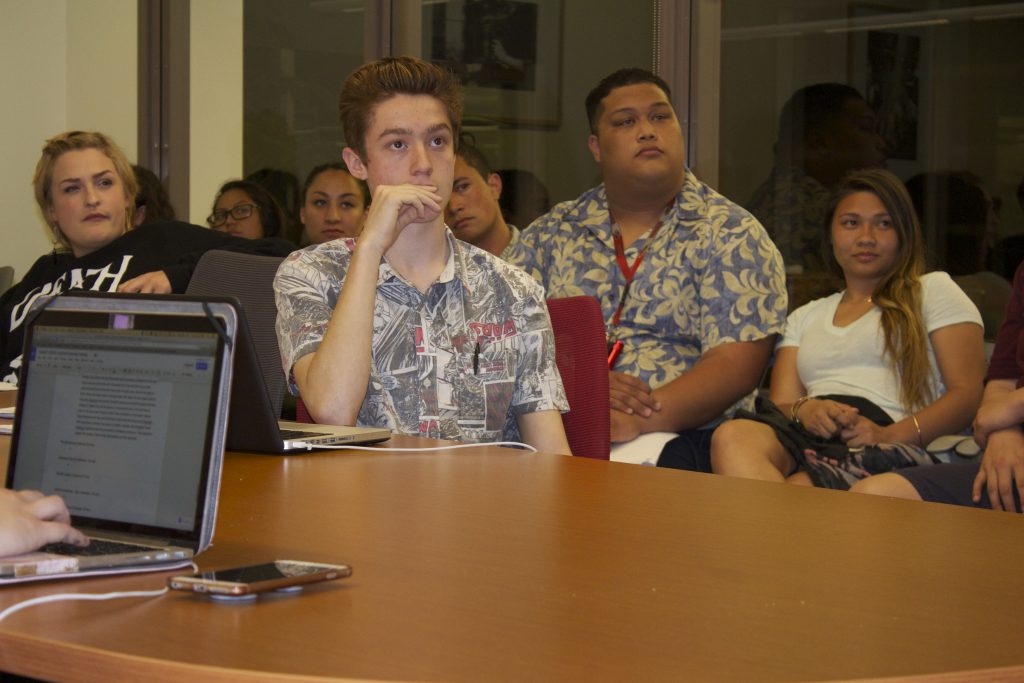
“There’s a storm outside, and there’s a storm inside,” said Darius Kila during a recess of what would become a three and a half hour long deliberation by the Judicial Branch ultimately deciding that it was unconstitutional to allow Kila and his running mate Shanztyn Nihipali to be on the ballot for ASSOU President and Vice President.
“ASSOU has a list of values that we abide by and some of them being the commitment to diversity and inclusion at Southern Oregon University,” Kila said at the hearing. “These documents, bylaws and rules that uphold the constitution are contradicting of each other, and this, then, ultimately draws to the legitimacy of it all.” He warned “these actions can be arbitrary, capricious and ultimately discriminatory.”
The debate regarding whether or not to allow these individuals to run began last week when Kila and Nihipali first submitted an application despite the fact that neither of them met the cumulative GPA requirement of 2.5. Elections rejected this first application because of this requirement. The minutes from that meeting have yet to be posted. The applicants submitted an appeal to the committee on the grounds that the election rule was unclear regarding whether or not the candidate’s GPA had to be cumulative or from the previous term.
The committee accepted the appeal and after hearing their argument, voted unanimously to add Kila and Nihipali to the ballot a day into elections. The reason for their reversal and interpretation of the rule, according to committee member Caitlin Scharer was “there was a lot of pressure to do it and they had a very compelling case.”
“The biggest deciding factor was that there was nobody against it. No one attended that meeting that was against having them run,” said Scharer. “Personally, I didn’t want to sit in front of a panel of people who were all in favor of letting them run and be that one person who raised their hand and said ‘I abstain for this vote,’ or ‘I vote no.’” However, she said she knew judiciary’s ruling was inevitable. “Our argument essentially contradicted itself,” she said.

“Frankly I do think GPA is a very important requirement. Student government work, in order to be done competently and properly requires a lot of care and dedication,” said Jacob Rubanowitz, the elections committee chairperson, before the committee’s meeting on Tuesday. “Some sort of standard, some sort of minimum I think should be upheld.”
“Fairness is about people being allowed the same chances and opportunities,” Rubanowitz insisted at the grievance hearing.
Just hours after passing this motion, Matthew Soloway and Andrew Zucker filed a grievance against Elections Committee citing Election, Executive, and Constitutional rules. “We should open a dialogue about the GPA requirement and whether or not it should be changed,” said Zucker in his opening statement. “That is a dialogue that the entire student body needs to be engaged in though, not just the five seated members of elections committee and the four justices.” Throughout the hearing, he reminded the justices and the gallery “this grievance wasn’t filed against Darius and Shanztyn.”
The applicants were accompanied by letters of support and people who stayed during the whole meeting to show solidarity for Kila and Nihipali. In one of these letters, Kelly R. Moutsatson, Director of Admissions and Co-Executive Director of Student Enrollment said “I am hoping as you review each of these candidates, that a more holistic approach is taken, particularly since both are so close to the 2.5 GPA requirement.”
Those who opposed the decision made by Elections Committee also wrote in. “If this part of the constitution is ignored, what other parts can ASSOU also ignore,” asked Cheyenne Canfield in her letter.
During deliberations, Chief Justice Brandon Zarringhalam, said, “It says a lot that they had so much support come in, but we have to interpret the rules as they state.”
The Judicial branch decided to reject Darius and Shanztyn as candidates for this election and their removal from the ballot.
“Darius and Shanztyn, this was amazing of you all to come out here and have your voices heard,” said Zarringhalam. “But we need to follow the constitution and how it is written.”
“Judiciary does not have the ability to create laws in our constitution document. The changes have to be made by elected officials,” said Associate Justice Ricardo Lujan. “I’ve never thought of a GPA oppression and I think that if students are interested in getting the constitution changed, keep fighting but it can’t be done tonight.”



